Serving 1,300 students in grades 9-12, Springfield High School ranks in the bottom 50% of all schools in Oregon for overall test scores (math proficiency is bottom 50%, and reading proficiency is bottom 50%).
The percentage of students achieving proficiency in math is ≤5% (which is lower than the Oregon state average of 31%). The percentage of students achieving proficiency in reading/language arts is 15-19% (which is lower than the Oregon state average of 44%).
The student:teacher ratio of 21:1 is higher than the Oregon state level of 17:1.
Minority enrollment is 48% of the student body (majority Hispanic), which is higher than the Oregon state average of 42% (majority Hispanic).
Quick Stats (2025)
- Grades: 9-12
- Enrollment: 1,300 students
- Student:Teacher Ratio: 21:1
- Minority Enrollment: 48%
- Graduation Rate: 74% (Btm 50% in OR)
- Overall Testing Rank: Bottom 50%
- Math Proficiency: ≤5% (Btm 50%)
- Reading Proficiency: 15-19% (Btm 50%)
- Science Proficiency: 15-19% (Btm 50%)
- Source: National Center for Education Statistics (NCES), OR Dept. of Education
School Overview
Springfield High School's student population of 1,300 students has declined by 6% over five school years.
The teacher population of 63 teachers has grown by 6% over five school years.
Grades Offered
Grades 9-12
(offers virtual instruction)
(offers virtual instruction)
Total Students
1,300 students
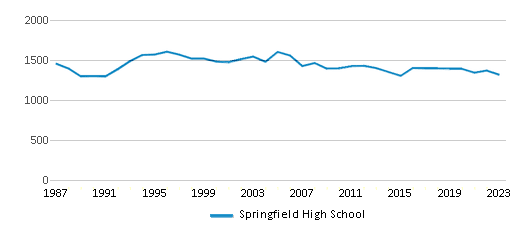
Gender %
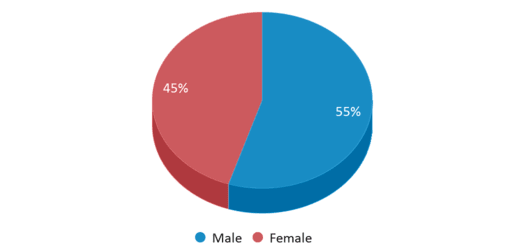
Total Classroom Teachers
63 teachers
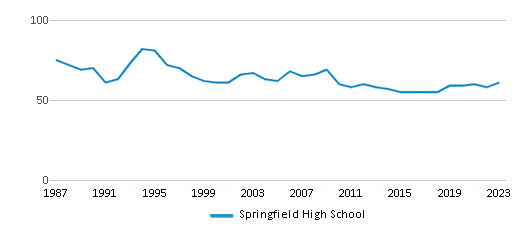
Students by Grade
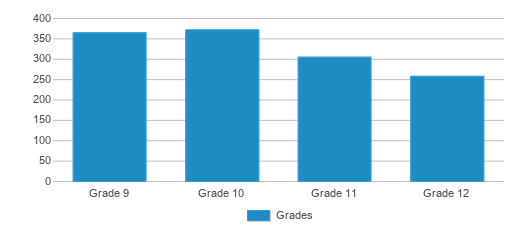
School Rankings
Springfield High School ranks within the bottom 50% of all 1,196 schools in Oregon (based off of combined math and reading proficiency testing data).
The diversity score of Springfield High School is 0.61, which is more than the diversity score at state average of 0.60. The school's diversity has stayed relatively flat over five school years.
Overall Testing Rank
#1186 out of 1196 schools
(Bottom 50%)
(Bottom 50%)
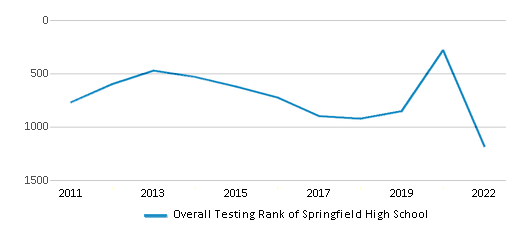
Math Test Scores (% Proficient)
≤5%
31%
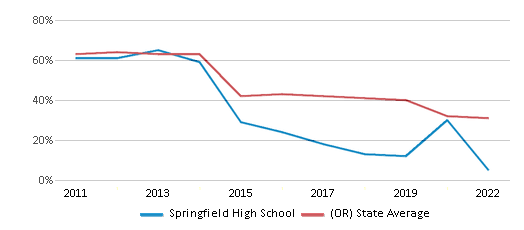
Reading/Language Arts Test Scores (% Proficient)
15-19%
44%
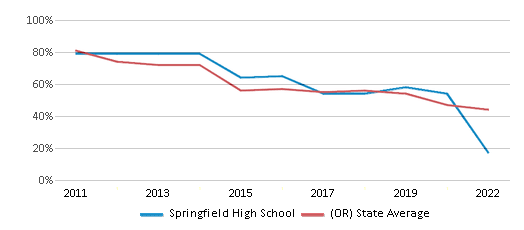
Science Test Scores (% Proficient)
15-19%
30%
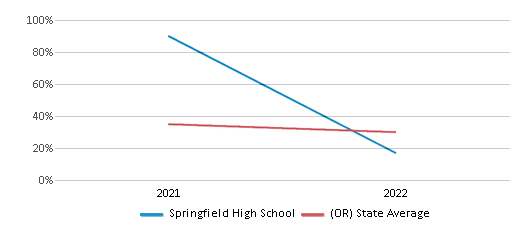
Student : Teacher Ratio
21:1
17:1
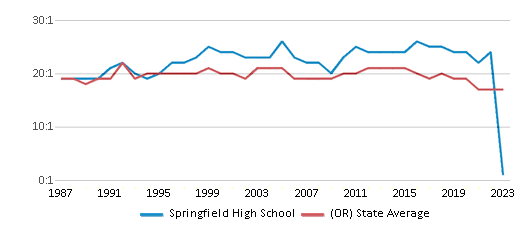
American Indian
1%
1%
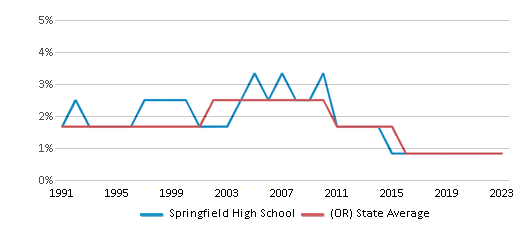
Asian
2%
4%
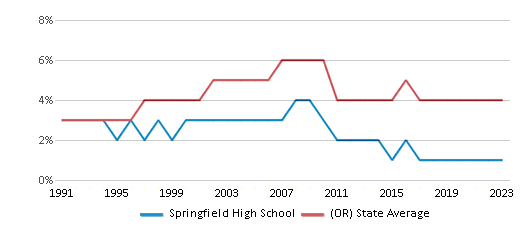
Hispanic
34%
26%
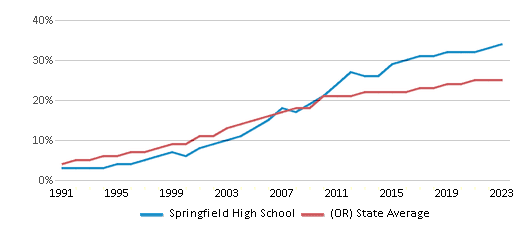
Black
2%
3%
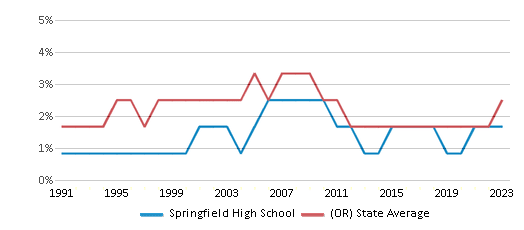
White
52%
58%
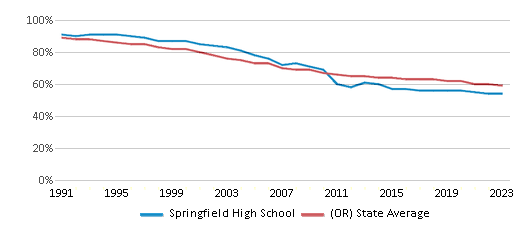
Hawaiian
1%
1%
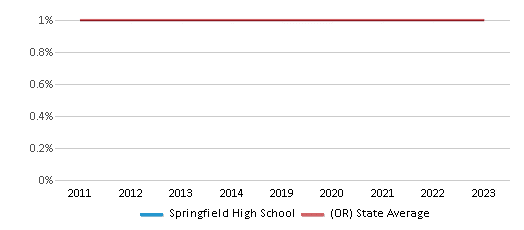
Two or more races
8%
7%
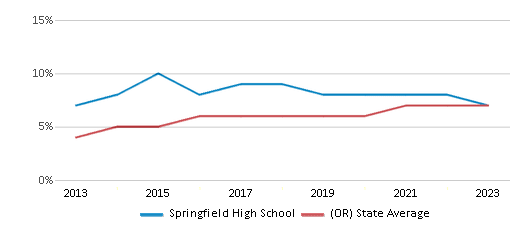
All Ethnic Groups
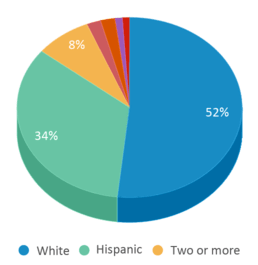
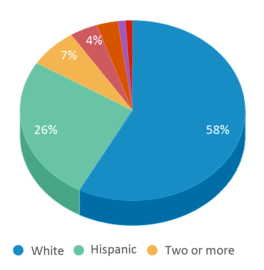
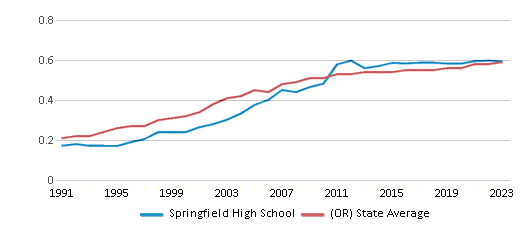
Graduation Rate
74%
81%
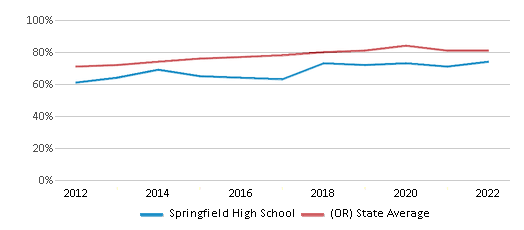
Eligible for Free Lunch
64%
51%
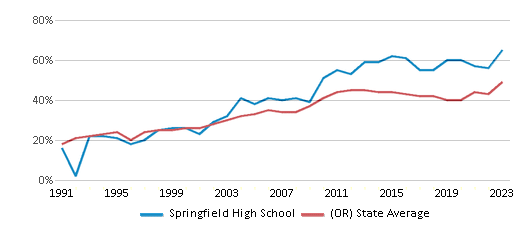
Eligible for Reduced Lunch (21-22)
8%
8%
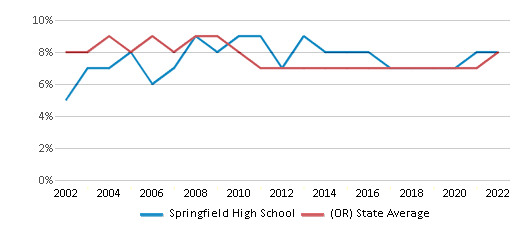
School Statewide Testing
School District Name
Source: National Center for Education Statistics (NCES), OR Dept. of Education
Profile last updated: 02/09/2025
Frequently Asked Questions
What is Springfield High School's ranking?
Springfield High School is ranked #1186 out of 1,196 schools, which ranks it among the bottom 50% of public schools in Oregon.
What schools are Springfield High School often compared to?
Springfield High Schoolis often viewed alongside schools like Thurston High School by visitors of our site.
What percent of students have achieved state testing proficiency in math and reading?
≤5% of students have achieved math proficiency (compared to the 31% OR state average), while 15-19% of students have achieved reading proficiency (compared to the 44% OR state average).
What is the graduation rate of Springfield High School?
The graduation rate of Springfield High School is 74%, which is lower than the Oregon state average of 81%.
How many students attend Springfield High School?
1,300 students attend Springfield High School.
What is the racial composition of the student body?
52% of Springfield High School students are White, 34% of students are Hispanic, 8% of students are Two or more races, 2% of students are Asian, 2% of students are Black, 1% of students are American Indian, and 1% of students are Hawaiian.
What is the student:teacher ratio of Springfield High School?
Springfield High School has a student ration of 21:1, which is higher than the Oregon state average of 17:1.
What grades does Springfield High School offer ?
Springfield High School offers enrollment in grades 9-12 (offers virtual instruction).
What school district is Springfield High School part of?
Springfield High School is part of Springfield SD 19 School District.
School Reviews
1 5/29/2021
For the most part, the teachers and instruction at Springfield High School have been pleasant. However, the current leadership both at the school and district level has failed the students. Springfield Public Schools has made it evident that their priority is to graduate as many students as possible, rather than providing a quality education. In 2020 the district cut all challenging science programs. A group of high school students, parents and community members went to voice concerns about the change to the school board. The leadership did not listen to the community. Currently, there is no option for academic rigor in any science class. As a graduating senior, I feel completely unprepared for my next chapter at university. I understand that it is important to get kids graduated, however, that should not come at the expense of the high-achieving students.
5 10/1/2011
I found the office staff to be unwilling to accommodate us when I took the time to go in at 3:30. We were told to come back the next day. Then she said she coundn't fing the other employee's paperwork, said she was tired and didn't have lunch. Said her computer had been turned off for the day. At that point I asked her if she was off the clock, and she sais no. So I expected her to be able to assist us. DISAPPOINTED!!!!
Review Springfield High School. Reviews should be a few sentences in length. Please include any comments on:
- Quality of academic programs, teachers, and facilities
- Availability of music, art, sports and other extracurricular activities
Recent Articles

What Is A Charter School?
Explore the world of charter schools in this comprehensive guide. Learn about their history, how they operate, and the pros and cons of this educational innovation. Discover key facts about charter schools, including admission policies, demographics, and funding, as well as what to look for when considering a charter school for your child.

10 Reasons Why High School Sports Benefit Students
Discover the 10 compelling reasons why high school sports are beneficial for students. This comprehensive article explores how athletics enhance academic performance, foster personal growth, and develop crucial life skills. From improved fitness and time management to leadership development and community representation, learn why participating in high school sports can be a game-changer for students' overall success and well-being.

February 05, 2025
Understanding the U.S. Department of Education: Structure, Impact, and EvolutionWe explore how the Department of Education shapes American education, from its cabinet-level leadership to its impact on millions of students, written for general audiences seeking clarity on this vital institution.





